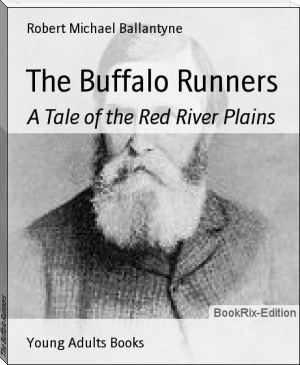The Buffalo Runners - Robert Michael Ballantyne (read aloud .txt) 📗

- Author: Robert Michael Ballantyne
Book online «The Buffalo Runners - Robert Michael Ballantyne (read aloud .txt) 📗». Author Robert Michael Ballantyne
It chanced that La Certe had pitched his tent the day before on a stream not far-distant from the colony. The Sioux had to pass that way, and, espying the wigwam, turned aside to wreak their vengeance on whomsoever it might contain. Fortunately the owner of the mansion and his wife had gone out fishing in a canoe, and taken the child with them. All that the Sioux could do, therefore, was to appropriate the poor man's goods and chattels; but as the half-breed had taken his gun, ammunition, and fishing-tackle with him, there was not much left to appropriate. Having despoiled the mansion, they set fire to it and went their way.
Returning in the evening, La Certe found his house a heap of ashes, and himself reduced to a state of destitution. This being his normal state, however, he was not profoundly affected. Neither was his wife; still less was his child.
He said no word, but carried the contents of the canoe on shore. His wife, equally reticent, helped him. His child, lighting its father's pipe, sat down to smoke and look on.
They turned the canoe bottom up to serve as a partial shelter; they kindled a huge fire before it; they set up three large fat ducks to roast in front of it, and were soon busy with a simple but satisfying supper. After washing this down with an unstimulating draught of pure water, they put the baby to bed under the bow of the canoe, filled their pipes, and sat down before the ruddy blaze to mingle their hopes, joys, prospects, and sorrows in a halo of smoke--the very personification of primitive contentment and felicity.
CHAPTER TWENTY EIGHT.
VERY PERPLEXING INTERVIEWS WITH LITTLE BILL.
Things in the colony had at this time come to what may be styled a complicated pass, for distress and starvation were rampant on the one hand, while on the other hand the weather was superb, giving prospect at last of a successful harvest.
The spring buffalo-hunt had been but partially successful, so that a number of the buffalo runners had to make arrangements to support themselves by fishing during the autumn in lakes Winnipeg and Manitoba.
In these great fresh-water seas there is an unlimited quantity of rich and finely flavoured whitefish, or Titameg, besides other fish. But Titameg are only to be caught in large quantities during autumn, and of course much of the success of fishing depends on weather--one gale sometimes visiting the fishermen with ruin--ruin all the more complete that the nets which may be carried away have in many cases to be paid for out of the produce of the season's fishing.
In addition to the buffalo-hunters, who were obliged to support themselves by fishing, there was a large number of idle half-breeds, of a much lower type than these plain hunters, who had to betake themselves to the same pursuit. These were the "ne'er-do-weels" of the colony; men who, like La Certe, with more or less--usually less--of his good-nature, seemed to hold that all the industrious people in the world were created to help or to support them and their families. Of course when the industrious people were unsuccessful, these idlers were obliged to work for their living, which, being unaccustomed to do anything energetic, they found it hard and difficult to do, and generally regarded themselves as the harshly used victims of a tyrannous fate.
There was one thing, however, at which these idlers were very expert and diligent--they begged well, and with persistency. No wonder; for their lives often depended on their persistent and successful begging. The Company and the private storekeepers were always more or less willing to risk their goods by advancing them on credit. Before the summer was over, most of these people had got their supplies and were off to the fishing grounds, regardless of the future, with large quantities of tea and tobacco, and happy as kings are said to be--but never are, if history be true!
Among these, of course, was La Certe. That typical idler had made the most of his misfortunes. Everybody had heard what the Sioux had done to him, and everybody had pitied him. Pity opens the heart, and that opens the hand; and, when the poor man entered a store with the polite manner of a French Canadian and the humble aspect of a ruined man, he scarcely required to beg. One man lent him a tent. Another lent him a canoe. From the Company's store at Fort Garry he received a fair outfit of nearly all that he could require. Further down the Settlement there was a private store-keeper with a jovial countenance.
"O it was a sad, sad sight!" he said to this man on entering the store--"so very sad to see my tent in ashes, and nothing left--nothing-- absolutely!" The jovial man was moved. He gave La Certe what he asked for--even pressed things on him, and also bestowed on him a considerable "gratuity."
Still further down the Settlement the unfortunate man found the store, or shop, of another friend. This man was saturnine of countenance, but moderately liberal of heart. La Certe approached him with an air so pitiful that the saturnine man melted like snow in the sunshine or wax under heat.
"I have heard of your loss," he said, "and I will give you credit _this_ time, La Certe, though you _are_ so bad at paying your debts. But I won't give you much."
"I do not want much," returned the afflicted man in tones of deep humility--"only a little--a very little."
By asking much more than he required, La Certe obtained as much as he wanted from the saturnine man, and thus he finally started for Lake Winnipeg with a canoe laden, almost to sinking, with the good things of this life.
The fineness of that summer brought forth the fruits of the earth in great luxuriance, and it really seemed as if at last the Scotch settlers were going to reap some reward for all their prolonged perseverance and industry. The long rest, the good feeding, the sunshine of nature, and the starlight of Elspie's eyes had a powerful effect on Dan Davidson's health, so that, by the time autumn arrived and the prospects of a splendid harvest became more certain every day, he had recovered much of his usual strength of body and vigour of mind.
Little Bill also felt the genial influences around him, and, to the intense joy of Archie, became visibly fatter and stronger, while his large blue eyes lost some of that wistfully solemn appearance with which they had been wont to gaze inquiringly into people's faces.
One afternoon Billie, having walked to the summer house in the Prairie Cottage garden, along with Archie, was left alone there at his own request, for, unlike other boys, he was fond of occasional solitary meditation.
"Now mind, Little Bill--you whistle if you want me," said Archie, when about to leave him. "I'll hear you, for I'm only going to the carpenter's shed."
"I will, Archie, if I want you; but I don't think I shall, for I can walk by myself now, quite easily, as far as the house."
But Little Bill was not destined to be left to solitary meditations that day, for his brother had not left him more than a few minutes when a footstep was heard on the path outside, and next moment Fred Jenkins presented himself at the opening of the summer-house. The face of the mariner betrayed him, for he was too honest by nature to dissemble effectively.
"Well, Fred, how are you? You seem a little disappointed, I think."
"Not exactly disappointed, Little Bill, but sort o' ways scumbusticated, so to speak--perplexed, if I may say so. Kind o' ways puzzled, d'ee see?"
There was something very amusing in the manner of the strapping seaman as he sat down beside the puny little boy, with a bashful expression on his handsome face, as if he were about to make a humiliating confession.
"What troubles you, Jenkins?" asked Billie, with the air of a man who is ready to give any amount of advice, or, if need be, consolation.
The seaman twisted his eyebrows into a complex form, and seemed uncertain how to proceed. Suddenly he made up his mind.
"Was you ever in love, Little Bill?" he asked abruptly, and with a smile that seemed to indicate a feeling that the question was absurd.
"O yes," answered the boy quite coolly. "I've been in love with brother Archie ever since I can remember."
Jenkins looked at his little friend with a still more complicated knot of puzzlement in his eyebrows, for he felt that Billie was scarcely fitted by years or experience to be a useful confidant. After resting his hands on his knees, and his eyes on the ground, for some time, he again made up his mind and turned to Billie, who sat with his large eyes fixed earnestly on the countenance of his tall friend, wondering what perplexed him so much, and waiting for further communications.
"Little Bill," said Jenkins, laying a large hand on his small knee, "in course you can't be expected to understand what I wants to talk about, but there's nobody else I'd like to speak to, and you're such a knowin' little shaver that somehow I felt a kind of--of notion that I'd like to ask your advice--d'ee see?"
"I see--all right," returned Billie; "though I wonder at such a man as you wanting advice from the like of me. But I'll do what I can for you, Jenkins, and perhaps I know more about the thing that troubles you than you think."
"I'm afraid not," returned the seaman, with a humorous twinkle in his eye. "You see, Billie, you never wanted to get spliced, did you?"
"Spliced! What's that?"
"Well, I should have said married."
"O no! I don't think the thought of that ever did occur to me. I'm sorry, Jenkins, but I really cannot give you advice on that subject."
"H'm! I'm not so sure o' that, Little Bill. You're such a practical little chap that I do believe if you was put to it you'd be able to-- see, now. If you happened to want to marry a nice little gal, what would you do?"
"I would ask her," said Little Bill, promptly.
"Jus' so; but that is what I have not got courage to do."
Jenkins laughed at the expression of blazing surprise with which the boy received this statement.
"Have not got courage!" he repeated; and then, after a pause--"Have all the stories you have told me, then, been nothing but lies!"
"What stories, Billie?"
"Why, such as that one about the pirates in the Java seas, when ten of them attacked you and you were obliged to kill four, and all the rest ran away?"
"No, Billie--that was no lie: it was quite true. But, then, these blackguards were cowards at bottom, and they saw that I'd got a brace o' double-barrelled pistols in my belt, and was pretty well up in the cutlass exercise."
"And that time when





Comments (0)